Diaries and documents of John Dominic Palandri - Part 29
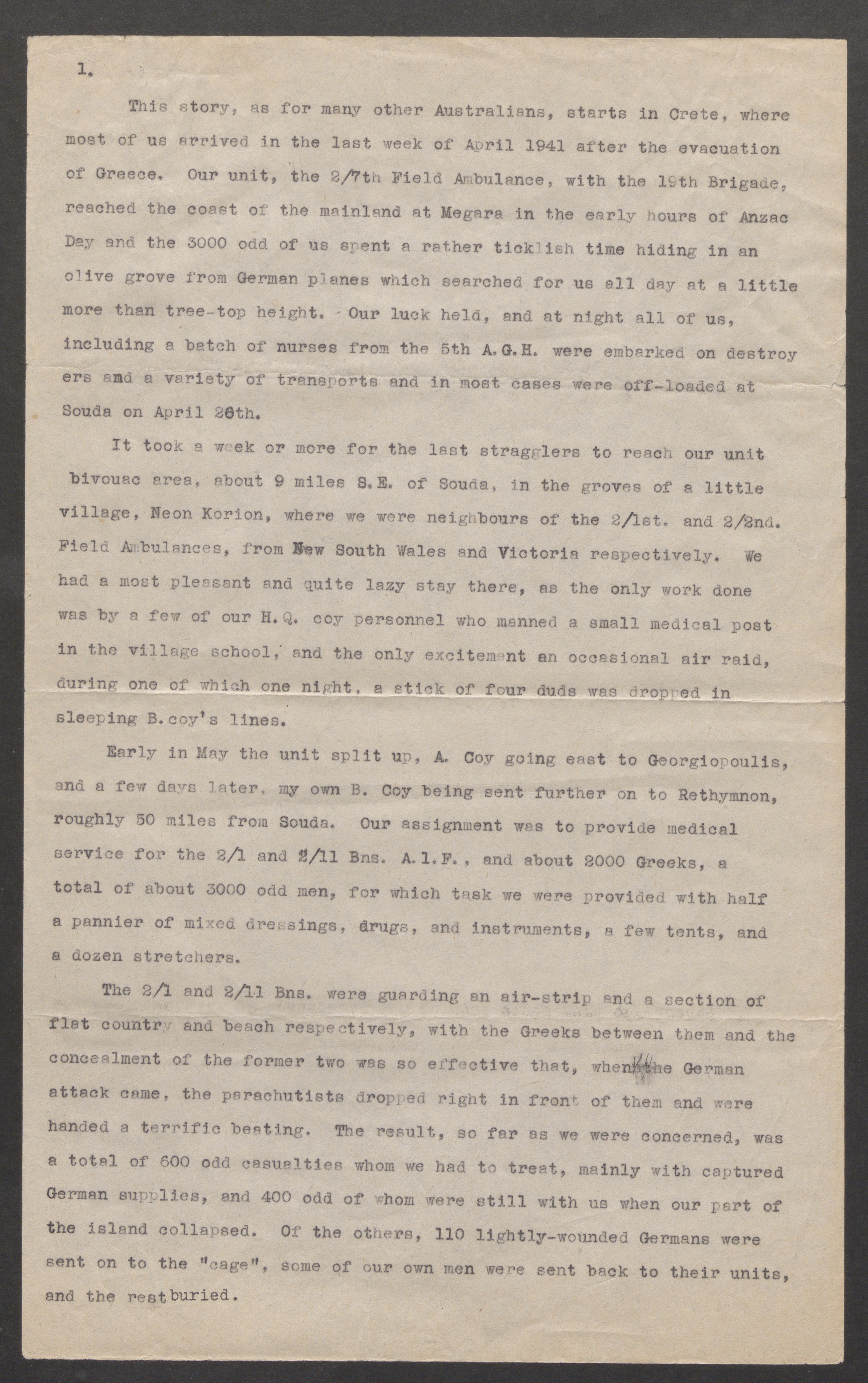
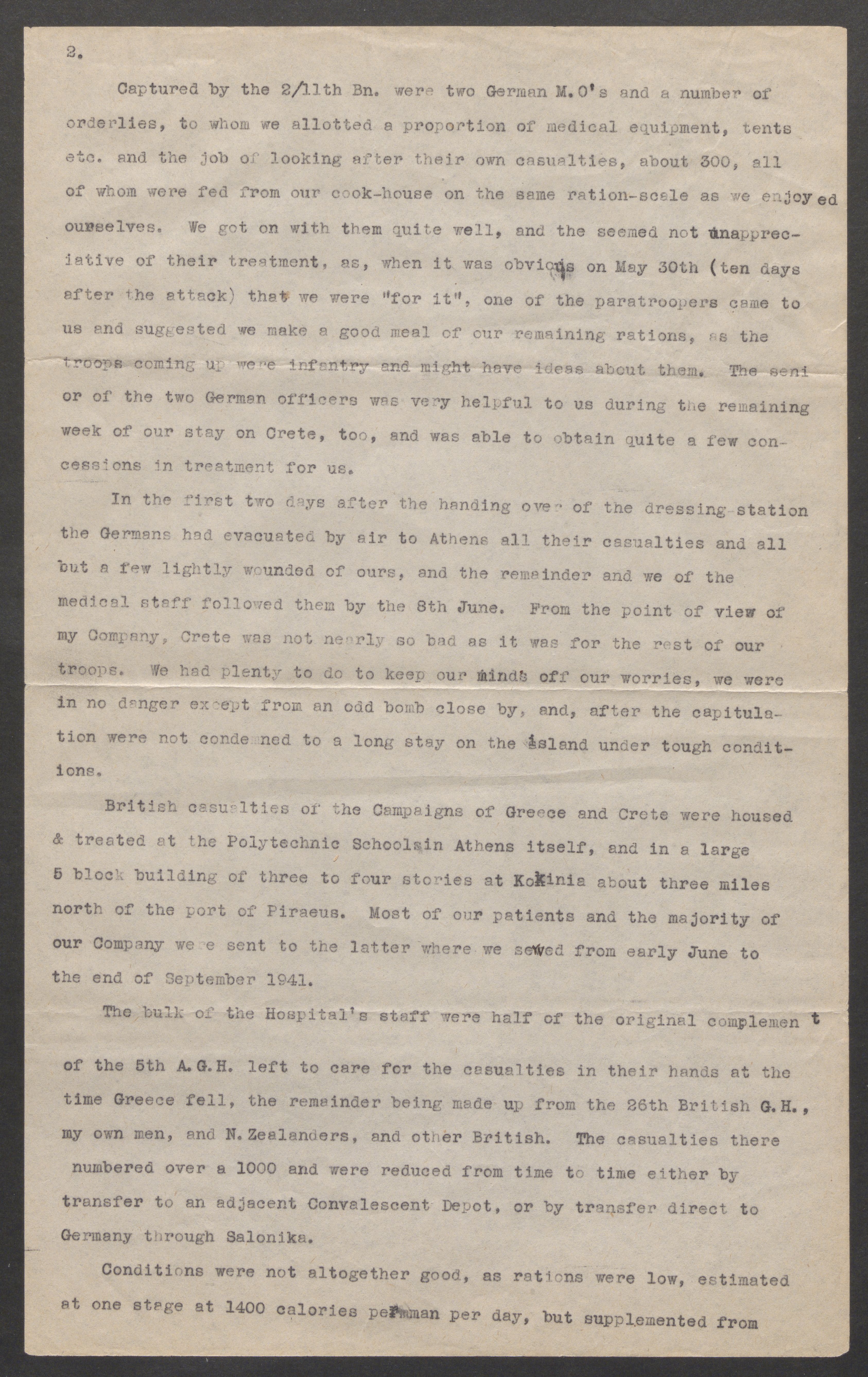
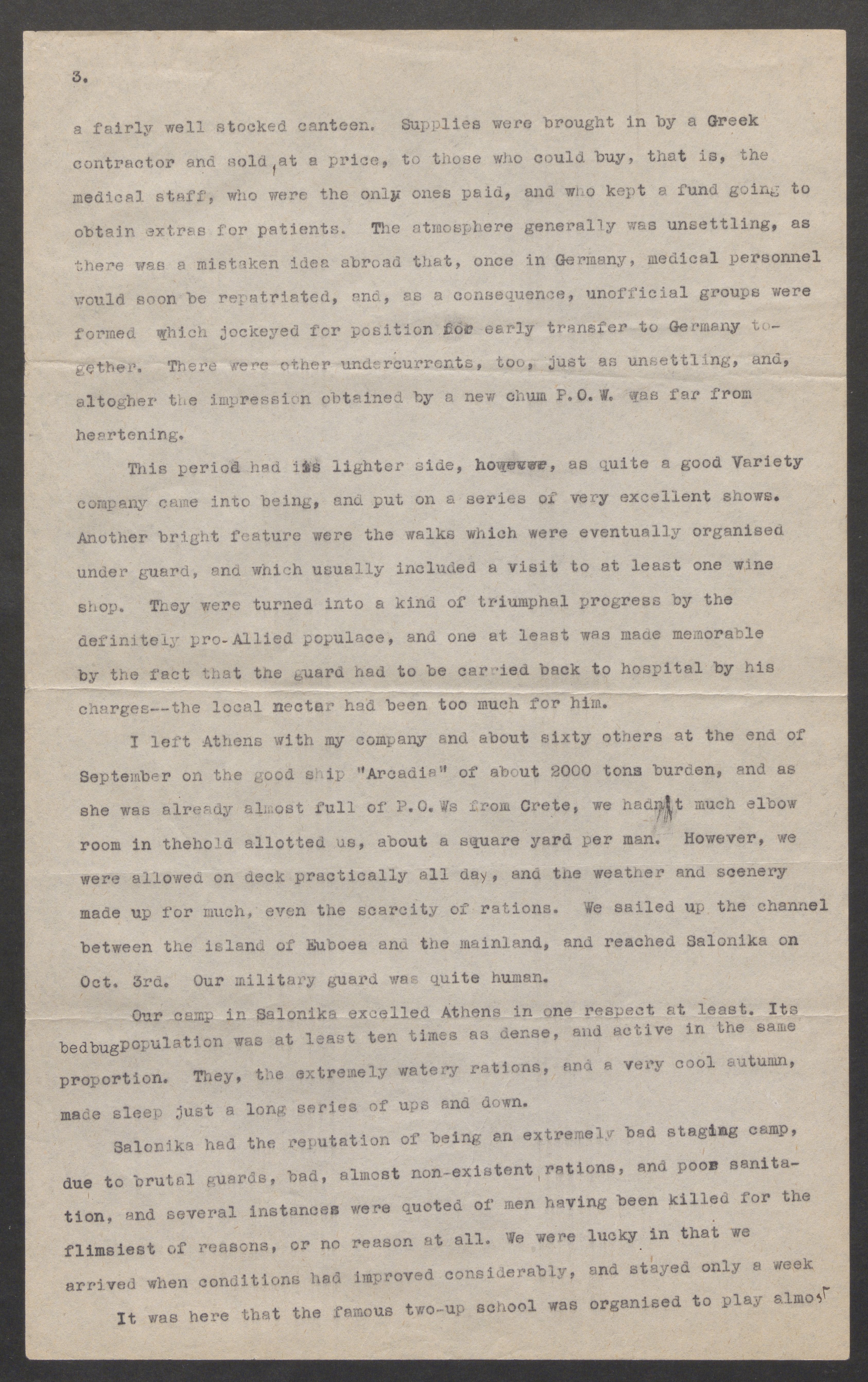
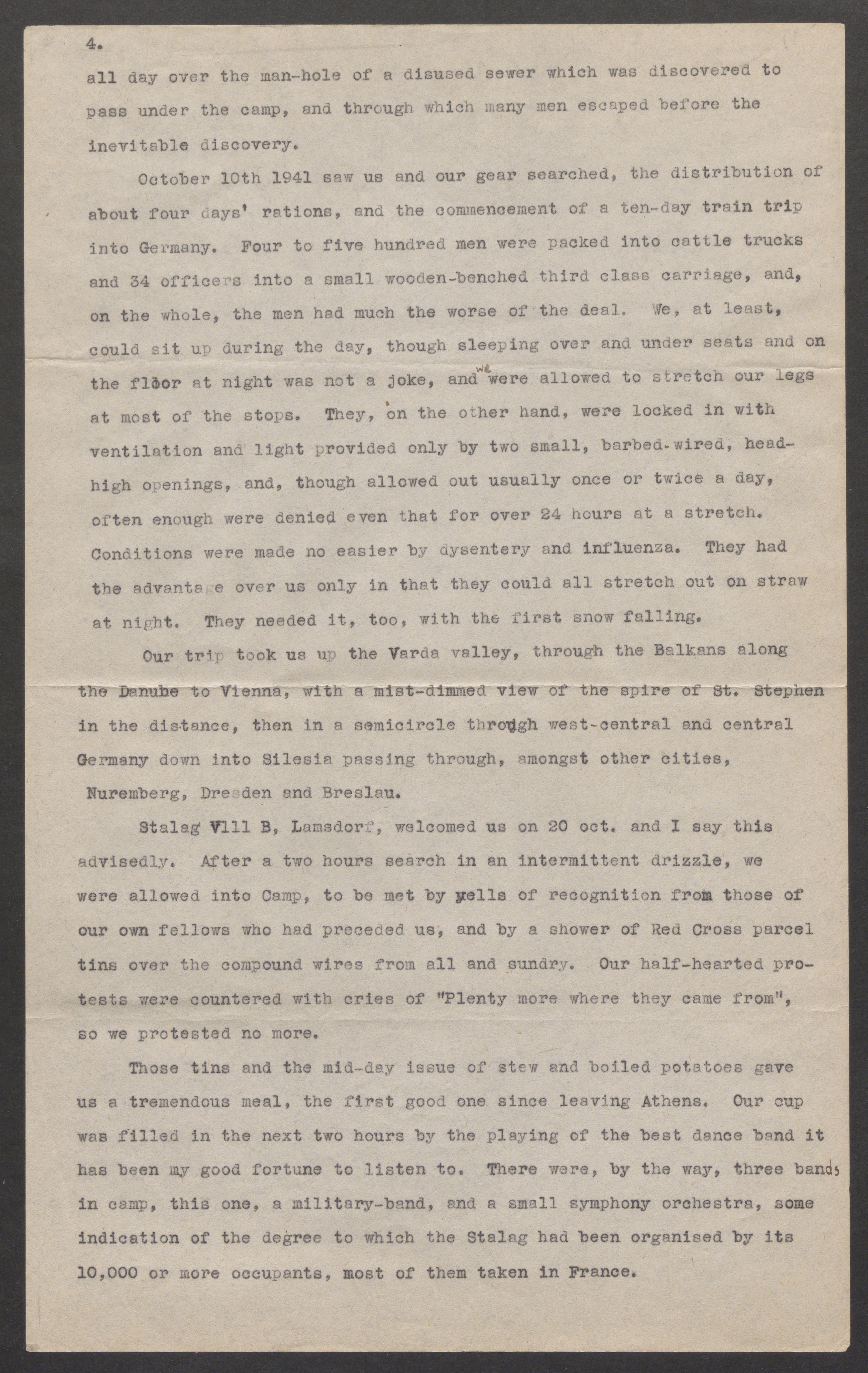
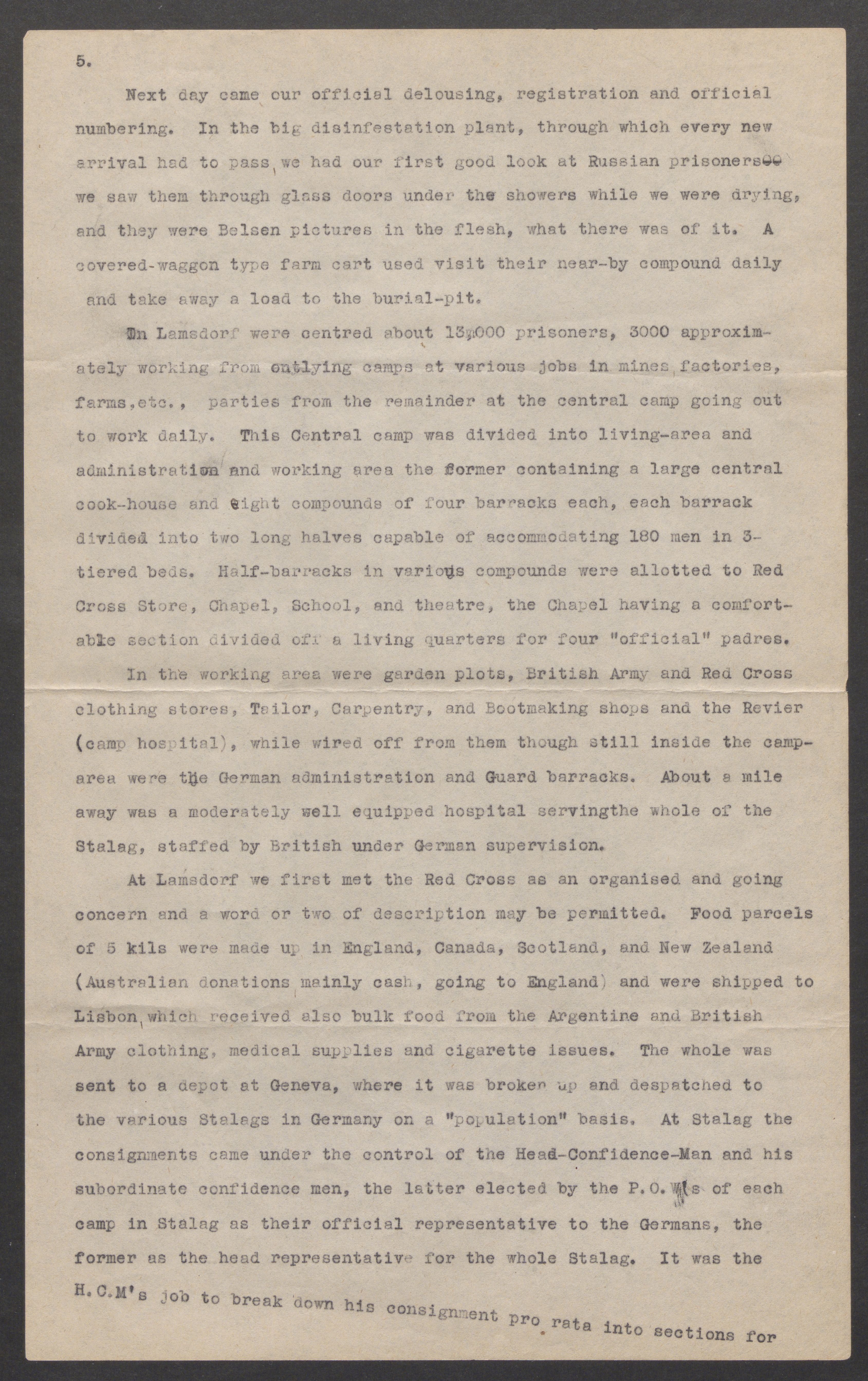
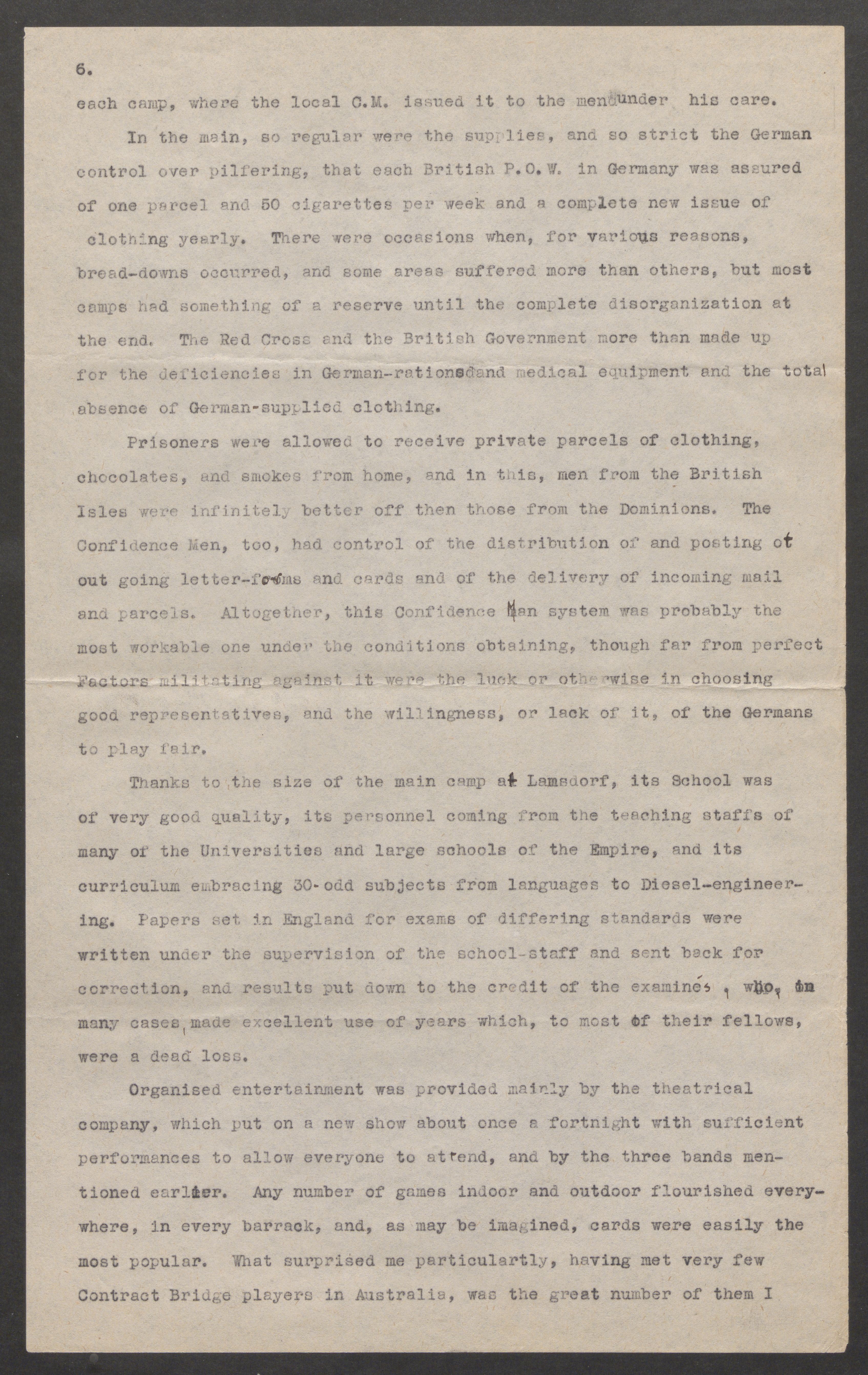
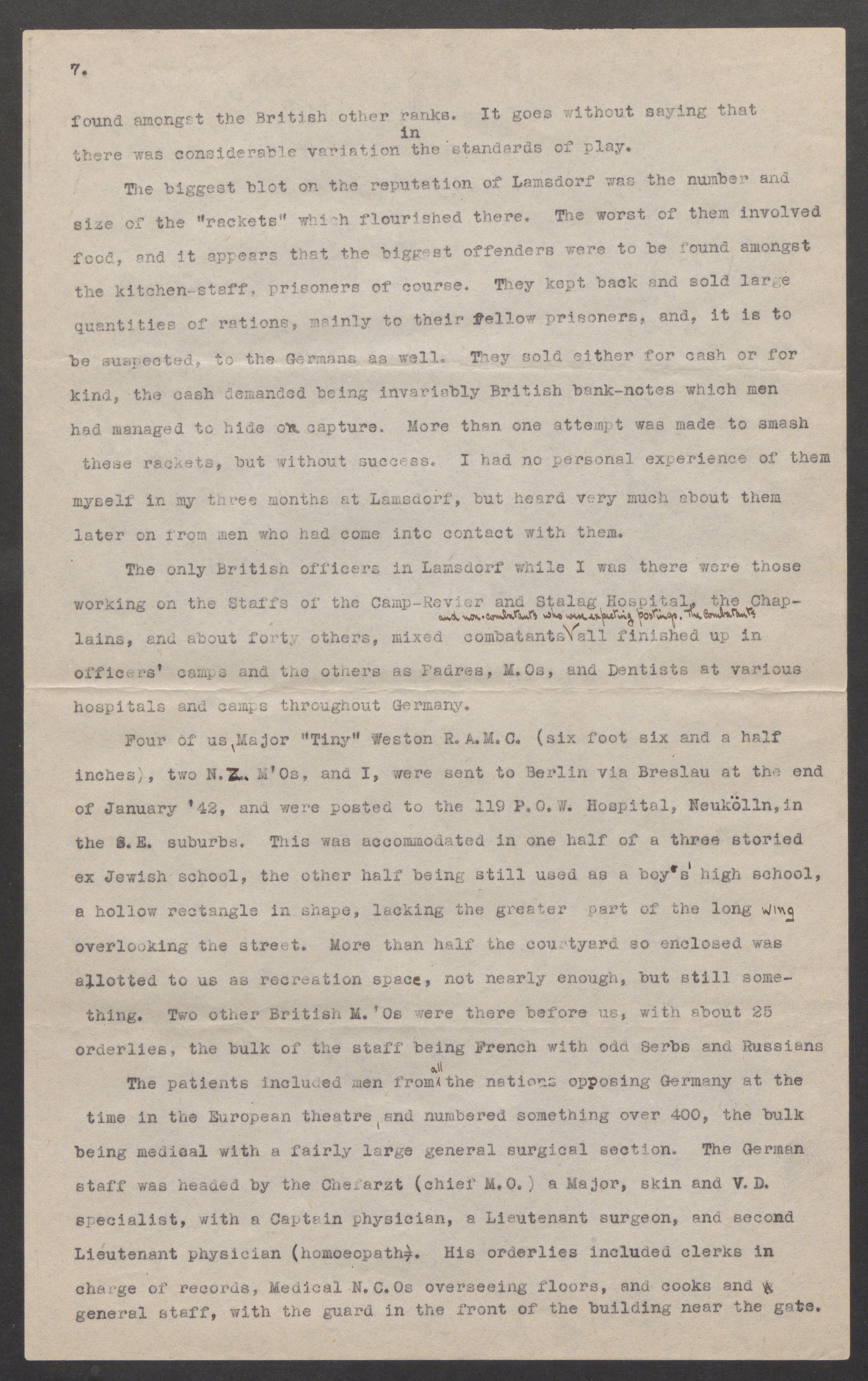
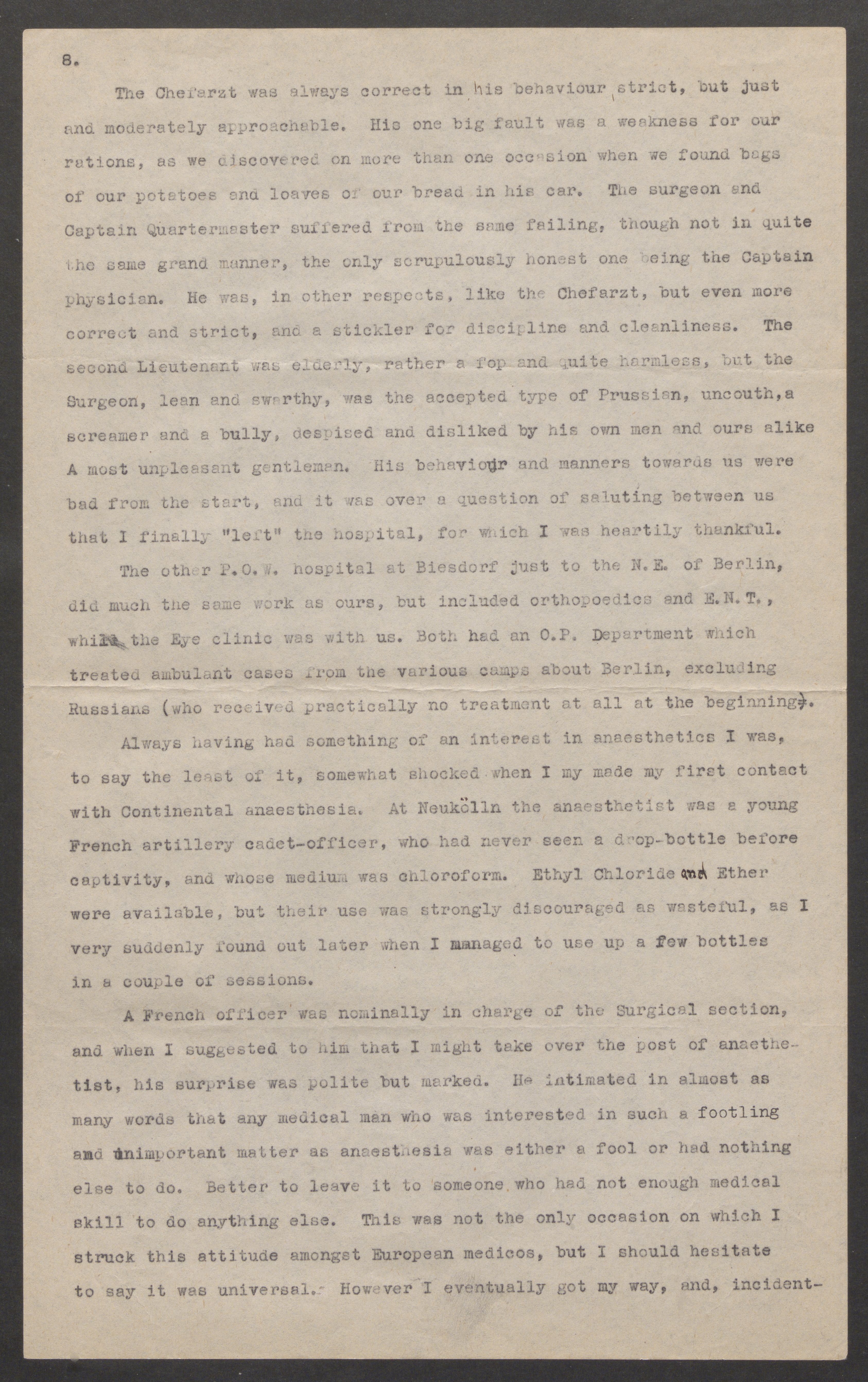
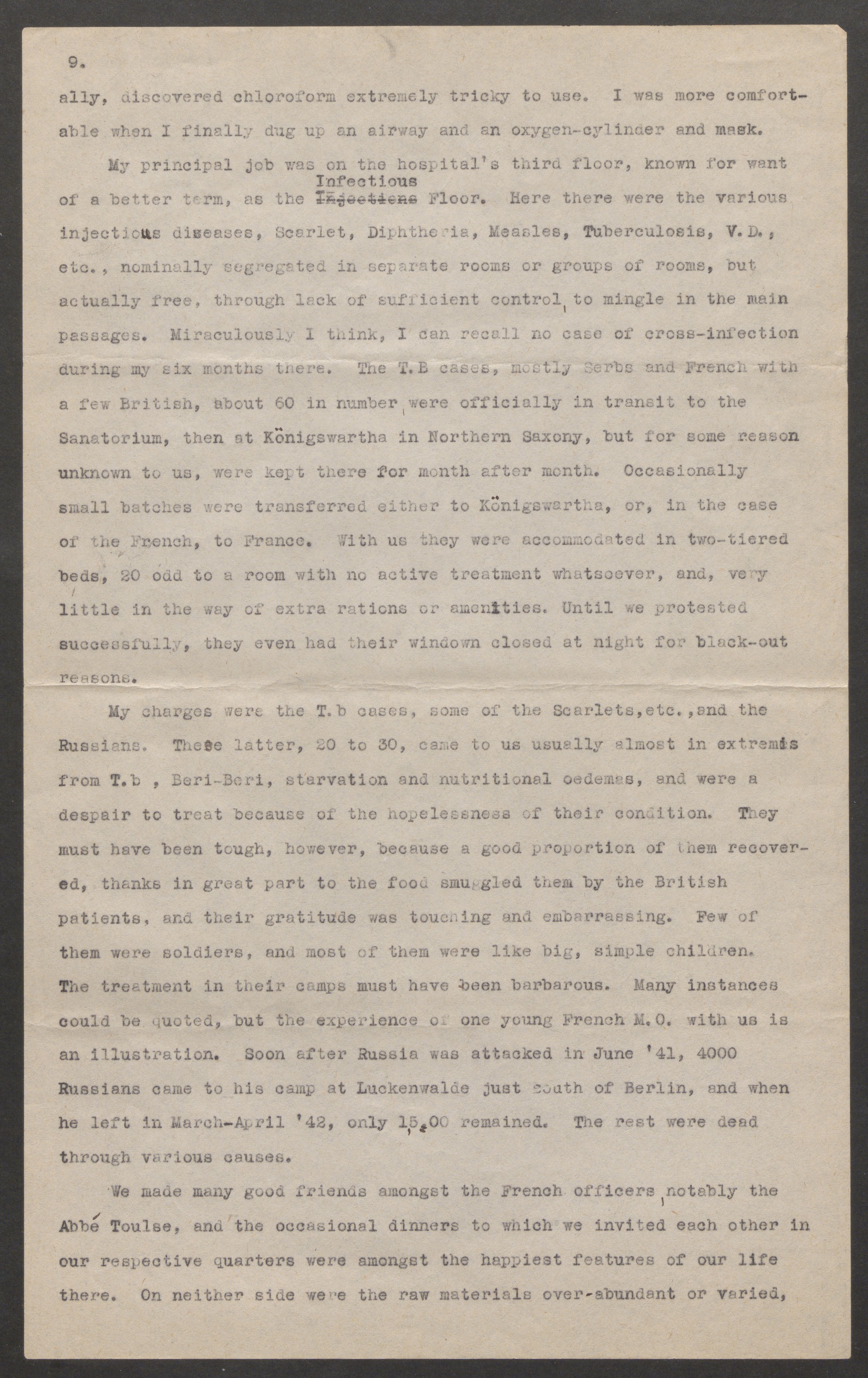
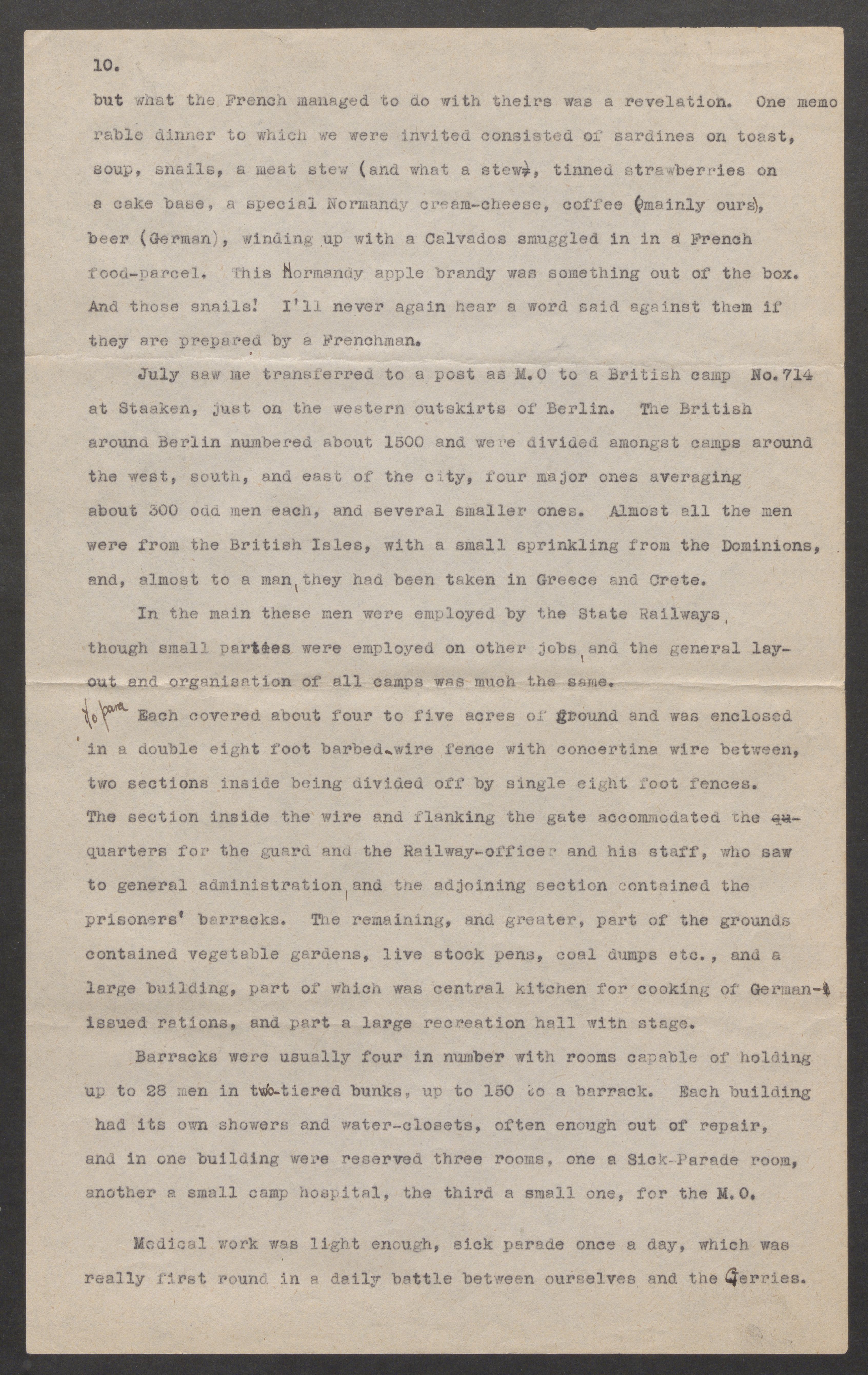
1.
This story, as for many other Australians, starts in Crete, where
most of us arrived in the last week of April 1941 after the evacuation
of Greece. Our unit, the 2/7th Field Ambulance, with the 19th Brigade,
reached the coast of the mainland at Megara in the early hours of Anzac
Day and the 3000 odd of us spent a rather ticklish time hiding in an
olive grove from German planes which searched for us all day at a little
more than tree-top height. Our luck held, and at night all of us,
including a batch of nurses from the 5th A.G.H. were embarked on destroyers
and a variety of transports and in most cases were off-loaded at
Souda on April 26th.
It took a week or more for the last stragglers to reach our unit
bivouac area, about 9 miles S.E. of Souda, in the groves of a little
village, Neon Korion, where we were neighbours of the 2/1st. and 2/2nd.
Field Ambulances, from New South Wales and Victoria respectively. We
had a most pleasant and quite lazy stay there, as the only work done
was by a few of our H.Q. coy personnel who manned a small medical post
in the village school, and the only excitement an occasional air raid,
during one of which one night, a stick of four duds was dropped in
sleeping B. coy's lines.
Early in May the unit split up, A. Coy going east to Georgiopoulis,
and a few days later, my own B. Coy being sent further on to Rethymnon,
roughly 50 miles from Souda. Our assignment was to provide medical
service for the 2/1 and 2/11 Bns. A.I.F. , and about 2000 Greeks, a
total of about 3000 odd men, for which task we were provided with half
a pannier of mixed dressings, drugs, and instruments, a few tents, and
a dozen stretchers.
The 2/1 and 2/11 Bns. were guarding an air-strip and a section of
flat country and beach respectively, with the Greeks between them and the
concealment of the former two was so effective that, when the German
attack came, the parachutists dropped right in front of them and were
handed a terrific beating. The result, so far as we were concerned, was
a total of 600 odd casualties whom we had to treat, mainly with captured
German supplies, and 400 odd of whom were still with us when our part of
the island collapsed. Of the others, 110 lightly-wounded Germans were
sent on to the "cage", some of our own men were sent back to their units,
and the rest buried.
2.
Captured by the 2/11th Bn. were two German M.O.'s, and a number of
orderlies, to whom we allotted a proportion of medical equipment, tents
etc. and the job of looking after their own casualties, about 300, all
of whom were fed from our cook-house on the same ration-scale as we enjoyed
ourselves. We got on with them quite well, and the seemed not unappreciative
of their treatment, as, when it was obvious on May 30th (ten days
after the attack) that we were "for it", one of the paratroopers came to
us and suggested we make a good meal of our remaining rations, as the
troops coming up were infantry and might have ideas about them. The senior
of the two German officers was very helpful to us during the remaining
week of our stay on Crete, too, and was able to obtain quite a few concessions
in treatment for us.
In the first two days after the handing over of the dressing station
the Germans had evacuated by air to Athens all their casualties and all
but a few lightly wounded of ours, and the remainder and we of the
medical staff followed them by the 8th June. From the point of view of
my Company, Crete was not nearly so bad as it was for the rest of our
troops. We had plenty to do to keep our minds off our worries, we were
in no danger except from an odd bomb close by, and, after the capitulation
were not condemned to a long stay on the island under tough conditions.
British casualties of the Campaigns of Greece and Crete were housed
& treated at the Polytechnic Schools in Athens itself, and in a large
5 block building of three to four stories at Kokinis about three miles
north of the port of Piraeus. Most of our patients and the majority of
our Company were sent to the latter where we served from early June to
the end of September 1941.
The bulk of the Hospital's staff were half of the original complement
of the 5th A.G.H. left to care for the casualties in their hands at the
time Greece fell, the remainder being made up from the 26th British G.H.,
my own men, and N. Zealanders, and other British. The casualties there
numbered over a 1000 and were reduced from time to time either by
transfer to an adjacent Convalescent Depot, or by transfer direct to
Germany through Salonika.
Conditions were not altogether good, as rations were low, estimated
at one stage at 1400 calories per mman per day, but supplemented from
3.
a fairly well stocked canteen. Supplies were brought in by a Greek
contractor and sold, at a price, to those who could buy, that is, the
medical staff, who were the only ones paid, and who kept a fund going to
obtain extras for patients. The atmosphere generally was unsettling, as
there was a mistaken idea abroad that, once in Germany, medical personnel
would soon be repatriated, and, as a consequence, unofficial groups were
formed which jockeyed for position for early transfer to Germany together.
There were other undercurrents, too, just as unsettling, and,
altogether the impression obtained by a new chum P.O.W. was far from
heartening.
This period had its lighter side, however, as quite a good Variety
company came into being, and put on a series of very excellent shows.
Another bright feature were the walks which were eventually organised
under guard, and which usually included a visit to at least one wine
shop. They were turned into a kind of triumphal progress by the
definitely pro-Allied populace, and one at least was made memorable
by the fact that the guard had to be carried back to hospital by his
charges -- the local nectar had been too much for him.
I left Athens with my company and about sixty others at the end of
September on the good ship "Arcadia" of about 2000 tons burden, and as
she was already almost full of P.O.Ws from Crete, we hadn't much elbow
room in the hold allotted us, about a square yard per man. However, we
were allowed on deck practically all day, and the weather and scenery
made up for much, even the scarcity of rations. We sailed up the channel
between the island of Euboea and the mainland, and reached Salonika on
Oct. 3rd. Our military guard was quite human.
Our camp in Salonika excelled Athens in one respect at least. Its
bedbug population was at least ten times as dense, and active in the same
proportion. They, the extremely watery rations, and a very cool autumn,
made sleep just a long series of ups and downs.
Salonika had the reputation of being an extremely bad staging camp,
due to brutal guards, bad, almost non-existent rations, and poor sanitation,
and several instances were quoted of men having been killed for the
flimsiest of reasons, or no reason at all. We were lucky in that we
arrived when conditions had improved considerably, and stayed only a week
It was here that the famous two-up school was organised to play almost
4.
all day over the man-hole of a disused sewer which was discovered to
pass under the camp, and through which many men escaped before the
inevitable discovery.
October 10th 1941 saw us and our gear searched, the distribution of
about four days' rations, and the commencement of a ten-day train trip
into Germany. Four to five hundred men were packed into cattle trucks
and 34 officers into a small wooden-benched third class carriage, and,
on the whole, the men had much the worse of the deal. We, at least,
could sit up during the day, though sleeping over and under seats and on
the floor at night was not a joke, and we were allowed to stretch our legs
at most of the stops. They, on the other hand, were locked in with
ventilation and light provided only by two small, barbed-wired, head-high openings, and, though allowed out usually once or twice a day,
often enough were denied even that for over 24 hours at a stretch.
Conditions were made no easier by dysentery and influenza. They had
the advantage over us only in that they could all stretch out on straw
at night. They needed it, too, with the first snow falling.
Our trip took us up the Varda valley, through the Balkans along
the Danube to Vienna, with a mist-dimmed view of the spire of St. Stephen
in the distance, then in a semicircle through west-central and central
Germany down into Silesia passing through, amongst other cities,
Nuremberg, Dresden and Breslau.
Stalag VIII B, Lamsdorf, welcomed us on 20 oct. and I say this
advisedly. After a two hours search in an intermittent drizzle, we
were allowed into Camp, to be met by yells of recognition from those of
our own fellows who had preceded us, and by a shower of Red Cross parcel
tins over the compound wires from all and sundry. Our half-hearted protests
were countered with cries of "Plenty more where they came from",
so we protested no more.
Those tins and the mid-day issue of stew and boiled potatoes gave
us a tremendous meal, the first good one since leaving Athens. Our cup
was filled in the next two hours by the playing of the best dance band it
has been my good fortune to listen to. There were, by the way, three bands
in camp, this one, a military-band, and a small symphony orchestra, some
indication of the degree to which the Stalag had been organised by its
10,000 or more occupants, most of them taken in France.
5.
Next day came our official delousing, registration and official
numbering. In the big disinfestation plant, through which every new
arrival had to pass, we had our first good look at Russian prisoners00
we saw them through glass doors under the showers while we were drying,
and they were Belsen pictures in the flesh, what there was of it. A
covered-waggon type farm cart used visit their near-by compound daily
and take away a load to the burial-pit.
In Lamsdorf were centred about 13,000 prisoners, 3000 approximately
working from outlying camps at various jobs in mines, factories,
farms, etc., parties from the remainder at the central camp going out
to work daily. This Central camp was divided into living-area and
administration and working area the former containing a large central
cook-house and eight compounds of four barracks each, each barrack
divided into two long halves capable of accommodating 180 men in 3-tiered
beds. Half-barracks in various compounds were allotted to Red
Cross Store, Chapel, School, and theatre, the Chapel having a comfortable
section divided off a living quarters for four "official" padres.
In the working area were garden plots, British Army and Red Cross
clothing stores, Tailor, Carpentry, and Bootmaking shops and the Revier
(camp hospital), while wired off from them though still inside the camp-area
were the German administration and Guard barracks. About a mile
away was a moderately well equipped hospital serving the whole of the
Stalag, staffed by British under German supervision.
At Lamsdorf we first met the Red Cross as an organised and going
concern and a word or two of description may be permitted. Food parcels
of 5 kils were made up in England, Canada, Scotland, and New Zealand
(Australian donations mainly cash, going to England) and were shipped to
Lisbon, which received also bulk food from the Argentine and British
Army clothing, medical supplies and cigarette issues. The whole was
sent to a depot at Geneva, where it was broken up and despatched to
the various Stalags in Germany on a "population" basis. At Stalag the
consignments came under the control of the Head-Confidence-Man and his
subordinate confidence men, the latter elected by the P.O.Ws of each
camp in Stalag as their official representative to the Germans, the
former as the head representative for the whole Stalag. It was the
H.C.M.'s job to break down his consignment pro rata into sections for
6.
each camp, where the local C.M. issued it to the men under his care.
In the main, so regular were the supplies, and so strict the German
control over pilfering, that each British P.O.W. in Germany was assured
of one parcel and 50 cigarettes per week and a complete new issue of
clothing yearly. There were occasions when, for various reasons,
bread-downs occurred, and some areas suffered more than others, but most
camps had something of a reserve until the complete disorganization at
the end. The Red Cross and the British Government more than made up
for the deficiencies in German-rationsd and medical equipment and the total
absence of German-supplied clothing.
Prisoners were allowed to receive private parcels of clothing,
chocolates, and smokes from home, and in this, men from the British
Isles were infinitely better off then those from the Dominions. The
Confidence Men, too, had control of the distribution of and posting of
out going letter-forms and cards and of the delivery of incoming mail
and parcels. Altogether, this Confidence Man system was probably the
most workable one under the conditions obtaining, though far from perfect
Factors militating against it were the luck or otherwise in choosing
good representatives, and the willingness, or lack of it, of the Germans
to play fair.
Thanks to the size of the main camp at Lamsdorf, its School was
of very good quality, its personnel coming from the teaching staffs of
many of the Universities and large schools of the Empire, and its
curriculum embracing 30-odd subjects from languages to Diesel-engineering.
Papers set in England for exams of differing standards were
written under the supervision of the school-staff and sent back for
correction, and results put down to the credit of the examinés, who in
many cases, made excellent use of years which, to most of their fellows,
were a dead loss.
Organised entertainment was provided mainly by the theatrical
company, which put on a new show about once a fortnight with sufficient
performances to allow everyone to attend, and by the three bands mentioned
earlier. Any number of games indoor and outdoor flourished everywhere,
in every barrack, and, as may be imagined, cards were easily the
most popular. What surprised me particulartly, having met very few
Contract Bridge players in Australia, was the great number of them I
7.
found amongst the British other ranks. It goes without saying that
there was considerable variation in the standards of play.
The biggest blot on the reputation of Lamsdorf was the number and
size of the "rackets" which flourished there. The worst of them involved
food, and it appears that the biggest offenders were to be found amongst
the kitchen-staff, prisoners of course. They kept back and sold large
quantities of rations, mainly to their fellow prisoners, and, it is to
be suspected, to the Germans as well. They sold either for cash or for
kind, the cash demanded being invariably British bank-notes which men
had managed to hide or capture. More than one attempt was made to smash
these rackets, but without success. I had no personal experience of them
myself in my three months at Lamsdorf, but heard very much about them
later on from men who had come into contact with them.
The only British officers in Lamsdorf while I was there were those
working on the Staffs of the Camp-Revier and Stalag Hospital the Chaplains,
and about forty others, mixed combatants ^and non-combatants who were expecting postings. The Combatants all finished up in
officers' camps and the others as Padres, M.Os, and Dentists at various
hospitals and camps throughout Germany.
Four of us, Major "Tiny" Weston R.A.M.C. (six foot six and a half
inches), two N.Z. M'Os, and I, were sent to Berlin via Breslau at the end
of January '42, and were posted to the 119 P.O.W. Hospital, Neukölln, in
the S.E. suburbs. This was accommodated in one half of a three storied
ex Jewish school, the other half being still used as a boy s' high school,
a hollow rectangle in shape, lacking the greater part of the long wing
overlooking the street. More than half the courtyard so enclosed was
allotted to us as recreation space, not nearly enough, but still something. Two other British M.'Os were there before us, with about 25
orderlies, the bulk of the staff being French with odd Serbs and Russians
The patients included men from ^ all the nations opposing Germany at the
time in the European theatre, and numbered something over 400, the bulk
being medical with a fairly large general surgical section. The German
staff was headed by the Chefarzt (chief M.O.) a Major, skin and V.D.
specialist, with a Captain physician, a Lieutenant surgeon, and second
Lieutenant physician (homoeopath). His orderlies included clerks in
charge of records, Medical N.C.Os overseeing floors, and cooks and g
general staff, with the guard in the front of the building near the gate.
8.
The Chefarzt was always correct in his behaviour, strict, but just
and moderately approachable. His one big fault was a weakness for our
rations, as we discovered on more than one occasion when we found bags
of our potatoes and loaves of our bread in his car. The surgeon and
Captain Quartermaster suffered from the same failing, though not in quite
the same grand manner, the only scrupulously honest one being the Captain
physician. He was, in other respects, like the Chefarzt, but even more
correct and strict, and a stickler for discipline and cleanliness. The
second Lieutenant was elderly, rather a fop and quite harmless, but the
Surgeon, lean and swarthy, was the accepted type of Prussian, uncouth, a
screamer and a bully, despised and disliked by his own men and ours alike
A most unpleasant gentleman. His behaviour and manners towards us were
bad from the start, and it was over a question of saluting between us
that I finally "left" the hospital, for which I was heartily thankful.
The other P.O.W. hospital at Biesdorf just to the N.E. of Berlin,
did much the same work as ours, but included orthopoedics and E.N.T.,
while the Eye clinic was with us. Both had an O.P. Department which
treated ambulant cases from the various camps about Berlin, excluding
Russians (who received practically no treatment at all at the beginning).
Always having had something of an interest in anaesthetics I was,
to say the least of it, somewhat shocked when I my made my first contact
with Continental anaesthesia. At Neukölln the anaesthetist was a young
French artillery cadet-officer, who had never seen a drop-bottle before
captivity, and whose medium was chloroform. Ethyl Chloride and Ether
were available, but their use was strongly discouraged as wasteful, as I
very suddenly found out later when I managed to use up a few bottles
in a couple of sessions.
A French officer was nominally in charge of the Surgical section,
and when I suggested to him that I might take over the post of anaethetist,
his surprise was polite but marked. He intimated in almost as
many words that any medical man who was interested in such a footling
and unimportant matter as anaesthesis was either a fool or had nothing
else to do. Better to leave it to someone who had not enough medical
skill to do anything else. This was not the only occasion on which I
struck this attitude amongst European medicos, but I should hesitate
to say it was universal. However I eventually got my way, and, incidentally
9.
discovered chloroform extremely tricky to use. I was more comfortable
when I finally dug up an airway and an oxygen-cylinder and mask.
My principal job was on the hospital's third floor, known for want
of a better term as the Injections Infectious Floor. Here there were the various
injectious diseases, Scarlet, Diphtheria, Measles, Tuberculosis, V.D.,
etc. nominally segregated in separate rooms or groups of rooms, but
actually free, through lack of sufficient control, to mingle in the main
passages. Miraculously I think, I can recall no case of cross-infection
during my six months there. The T.B. cases, mostly Serbs and French with
a few British, about 60 in number, were officially in transit to the
Sanatorium, then at Königswartha in Northern Saxony, but for some reason
unknown to us, were kept there for month after month. Occasionally
small batches were transferred either to Königswartha, or, in the case
of the French, to France. With us they were accommodated in two-tiered
beds, 20 odd to a room with no active treatment whatsoever, and, very
little in the way of extra rations or amenities. Until we protested
successfully, they even had their windown closed at night for black-out
reasons.
My charges were the T.b cases, some of the Scarlets, etc., and the
Russians. These latter, 20 to 30, came to us usually almost in extremis
from T.b, Beri-Beri, starvation and nutritional oedemas, and were a
despair to treat because of the hopelessness of their condition. They
must have been tough, however, because a good proportion of them recovered,
thanks in great part to the food smuggled them by the British
patients, and their gratitude was touching and embarrassing. Few of
them were soldiers, and most of them were like big, simple children.
The treatment in their camps must have been barbarous. Many instances
could be quoted, but the experience of one young French M.O. with us is
an illustration. Soon after Russia was attacked in June '41, 4000
Russians came to his camp at Luckenwalde just south of Berlin, and when
he left in March-April '42, only 1,500 remained. The rest were dead
through various causes.
We made many good friends amongst the French officers, notably the
Abbé Toulse, and the occasional dinners to which we invited each other in
our respective quarters were amongst the happiest features of our life
there. On neither side were the raw materials over-abundant or varied,
10.
but what the French managed to do with theirs was a revelation. One memorable
dinner to which we were invited consisted of sardines on toast,
soup, snails, a meat stew (and what a stew), tinned strawberries on
a cake base, a special Normandy cream-cheese, coffee (mainly ours),
beer (German), winding up with a Calvados smuggled in in a French
food-parcel. This Normandy apple brandy was something out of the box.
And those snails! I'll never again hear a word said against them if
they are prepared by a Frenchman.
July saw me transferred to a post as M.O. to a British camp No.714
at Staaken, just on the western outskirts of Berlin. The British
around Berlin numbered about 1500 and were divided amongst camps around
the west, south, and east of the city, four major ones averaging
about 300 odd men each, and several smaller ones. Almost all the men
were from the British Isles, with a small sprinkling from the Dominions,
and, almost to a man, they had been taken in Greece and Crete.
In the main these men were employed by the State Railways,
though small parties were employed on other jobs, and the general layout
and organisation of all camps was much the same.
[*to para*] Each covered about four to five acres of ground and was enclosed
in a double eight foot barbed-wire fence with concertina wire between,
two sections inside being divided off by single eight foot fences.
The section inside the wire and flanking the gate accommodated the qu
quarters for the guard and the Railway-officer and his staff, who saw
to general administration, and the adjoining section contained the
prisoners' barracks. The remaining, and greater, part of the grounds
contained vegetable gardens, live stock pens, coal dumps etc., and a
large building, part of which was central kitchen for cooking of German-issued
rations, and part a large recreation hall with stage.
Barracks were usually four in number with rooms capable of holding
up to 28 men in two-tiered bunks, up to 150 to a barrack. Each building
had it own showers and water-closets, often enough out of repair,
and in one building were reserved three rooms, one a Sick-Parade room,
another a small camp hospital, the third a small one, for the M.O.
Medical work was light enough, sick parade once a day, which was
really first round in a daily battle between ourselves and the Gerries.
 Diane Ware
Diane WareThis transcription item is now locked to you for editing. To release the lock either Save your changes or Cancel.
This lock will be automatically released after 60 minutes of inactivity.